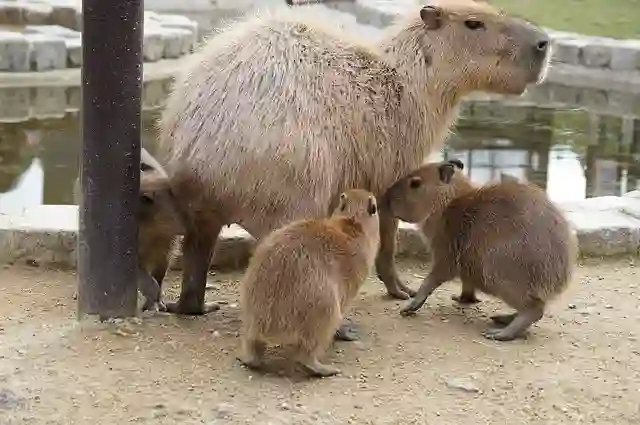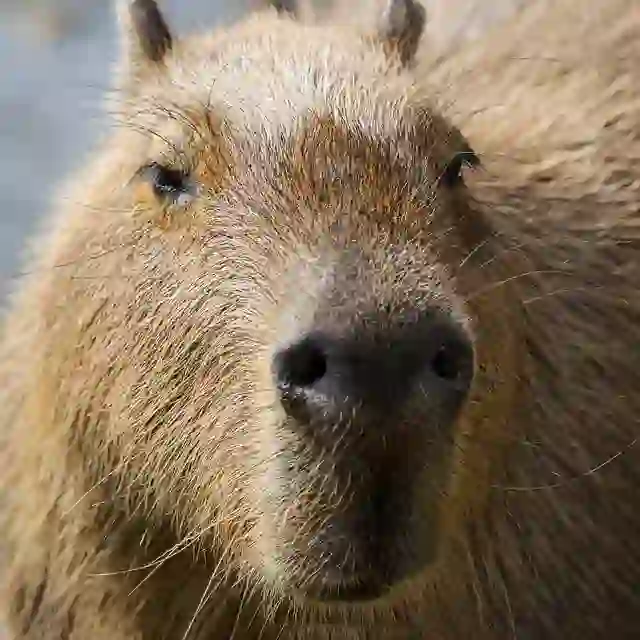One of my friends wanted to own a capybara, and he asked me if are capybaras dangerous, and if can capybaras be good pets.
Capybaras are not dangerous and doubt can be very good pets, in fact, they are one of the friendliest pets you can have.
Hey everyone, I’m Harry, and I’ve been a Capybara owner for more than 5 years, in this guide I’ll tell you if are Capybaras dangerous, do capybaras bite, and other related questions.
Contents
- 1 Are Capybaras Dangerous as a Pet?
- 2 Are Capybaras Dangerous to Humans? Do Capybaras Carry Diseases?
- 3 Can a Capybara Kill You? Has a Capybara Ever Killed Someone?
- 4 Are Capybaras Dangerous To Dogs?
- 5 Are Capybaras Dangerous to Livestock or Crops in Rural Areas?
- 6 Do Capybaras Become Dangerous as They Age?
- 7 Can You Domesticate a Capybara
- 8 How Do Capybaras Communicate Their Discomfort or Aggression?
- 9 What Are the Potential Risks of Owning a Capybara?
- 10 Are There Any Breeds or Varieties of Capybaras Known for Their Docility?
- 11 Are Capybaras Aggressive To Humans?
- 12 Is It Safe to Keep Capybaras with Other Pets?
- 13 Does Capybara Bite?
- 14 How to Cure a Capybara Bite Wound?
- 15 Capybara Bite Force
- 16 Capybara Bite Force PSI
- 17 What are Safety Precautions to be Taken Around Capybaras?
- 18 Can Capybaras Be Trained to Reduce Potential Danger?
- 19 Can a Capybara be Kept as a Pet?
- 20 What Animals do Capybaras Hang With? – Capybara with Other Animals
- 21 Are Capybaras Endangered in 2023?
- 22 Are Capybaras Herbivores?
- 23 To Wrap Up:
Are Capybaras Dangerous as a Pet?
No, capybaras are not dangerous animals, they are one of the friendliest pets and can be tamed, but should be treated nicely as they are, in fact, wild animals and should not be threatened as if threatened can bite as well.
I know there are many misconceptions and people don’t know much about capybaras. This is the reason why I’m writing this article, to let everyone know that capybaras are not dangerous, they are friendly and cool.
How can I say this? I can tell you from my own experience, that I have had capybaras for more than 5 years, and I never felt in danger, or threatened, in fact, capybaras love to cuddle.

Capybaras, those adorable creatures from South America, are totally harmless. They’re the friendliest and gentlest animals you can imagine! You’ll often find them chilling in groups near rivers or lakes, enjoying their peaceful lives.
Capybaras are herbivores and usually eat plants and vegetables, they are not predators at all, and that’s why there is no instinct to harm any human or in fact any other animal.
Do you know what’s even cooler? Capybaras can be real social butterflies. They’re totally down to hang out with us in places like parks or nature reserves. It’s an amazing experience to observe them up close and maybe even interact with them a bit.
I hope you got your answer to are capybaras dangerous but let me tell you this, capybaras are still wild animals, my friend.
They might get a bit aggressive if they feel threatened or trapped and may bite. So, it’s important to approach them with care, give them their space, and not make them uncomfortable.
And hey, don’t go poking or provoking them, okay? Let’s make sure we all stay safe. It’s not just about us humans, but also about the well-being of these sweet capybaras.
Things to keep in mind if you are a capybara owner:
- You should keep safety precautions while interacting with them.
- Do not corner them.
- Value space.
- Do not force them to interact with you.
- Gently rub their back and love them.
- But, keep in mind that after physically touching them, wash your hands and change your clothes because they can be harmful to your health.
Now you must have got your answer to whether are capybaras dangerous. Now let’s dive deep into this topic as you need to understand how capybaras show their aggression.
Are Capybaras Dangerous to Humans? Do Capybaras Carry Diseases?

People are sometimes afraid that capybaras may spread any disease or are capybaras poisonous? Yes, Capybaras can carry disease but nothing to be afraid of.
Let’s see how dangerous can capybaras be in terms of spreading diseases:
- One disease that most capybaras bring with them is Brazilian Spotted Fever (BSF).
- People used to pet them but if you want to keep them as pets then you should be a little cautious.
- Wild capybaras may carry ticks in their body which can be harmful, make sure to wash your hands after touching them and buy capybaras from good breeders only.
- Due to a lack of vitamin C, capybaras may get scurvy
- Furthermore, Stay away from the Capybara teeth. It can cause severe injury.
Now to answer the second question are capybaras dangerous to humans let me tell you as already stated they are not dangerous to humans, many people pet capybaras just because of their friendly and interactive nature.
How Do Capybaras Behave Around Humans?
I’ve had capybaras for the past 5 years and I’ve seen capybaras are not dangerous and are very friendly around humans, at first, they can be shy as well but they are always calm and chilling.
- Capybaras are social and they can be curious and playful around humans, especially in the presence of familiar people.
- Yes, capybaras are friendly and shy but they can be afraid around strangers or in new environments. It’s essential to respect their space and avoid sudden movements that might startle or stress them.
You need to understand one thing if you poke a capybara or any other animal and if they feel threatened by you they will defend themselves.
Can a Capybara Kill You? Has a Capybara Ever Killed Someone?
Hope you all got the answer to the question are capybaras dangerous? Now let’s understand can a capybara kill you? or has a capybara ever killed someone?
The straight answer is No, they won’t kill you. They are harmless cute animals with a super friendly nature.
Also, there are no such incidents where a capybara has killed someone.
People sometimes get afraid of my capybaras due to their big size and big teeth but as I make them meet my capybaras all their worries go away.
As of now, I believe I would have millions of times that capybaras are not dangerous and aggressive.
And by understanding their behavior and maintaining a harmonious relationship, capybaras can be very good companions without posing any danger to humans.
Are Capybaras Dangerous To Dogs?

Now, people do ask me this as well are capybaras dangerous to dogs as they own dogs as pets and want to own capybaras as well because of their super friendly behavior?
I also have a dog as my pet and capybaras as well and I can tell you there are no issues in having both of them as pets. However, it also depends on how you socialize both with each other.
See, capybaras are seen to get along with almost all of the pets, dogs are also very friendly but still proper socialization is required.
I’ve many capybaras and dogs together and they do form a good relationship with each other.
While capybaras are typically not aggressive towards dogs, there are some factors to consider to ensure the safety and well-being of both animals:
- Capybaras are larger than most of the dog breeds, there may occur some unintentional incidents so you need to be careful
- Capybaras are herbivores, they do not have any prey instinct, but dogs do have prey instinct, seeing a big animal may make them insecure, so give them time and socialize
With time, socialization, and training they both can be together easily. And it’s not the case of capybaras and dogs, it’s with any other animal you want to own, socialization and training are important.
Are Capybaras Dangerous to Livestock or Crops in Rural Areas?
Now let’s understand are capybaras dangerous to livestock or crops as being herbivores, capybaras may sometimes forage on crops as their food but they are not going to cause any significant damage. Capybaras are not dangerous to livestock as well.
However, there might be cases where capybaras’ natural habitat overlaps with farmland, it’s good to do proper fencing without harming any animals.
Understanding their behavior and implementing coexistence strategies can foster peaceful interactions between capybaras and rural communities, minimizing any potential risks to livestock or crops.
Do Capybaras Become Dangerous as They Age?
Being a capybara owner, I’ve observed their nature for the past 5 years, and it’s not like they tend to become more aggressive as they age. Capybaras are very friendly in their entire life.
There might be some animals who may become aggressive as they age, For most mammals, puberty is marked by an increase in aggression.
However, capybaras may become aggressive if there are any territorial issues in their habitat or if they feel threatened, otherwise, it’s a no!
Remember there is a difference between being dangerous or aggressive. Capybaras are not dangerous but they can be aggressive which any other animal or human can be. And of course, proper socialization of your capybaras will reduce these risks.
By understanding their behavior and providing responsible care, capybaras can remain peaceful and pose little to no danger, fostering a harmonious relationship with their human companions.
Can You Domesticate a Capybara

Yes, you can domesticate capybaras in several countries but it is not as common to domesticate a capybara in the same way you might domesticate a dog or a cat as capybaras are exotic wildlife animals.
To domesticate a capybara you need to see whether it is allowed in your state or country to keep them as a pet, are there any legal requirements like having a license or a veterinarian certificate?
I have domesticated capybaras for so many years, and I know many who own capybaras as a pet, they do not face any issue in keeping them as a pet.
How Do Capybaras Communicate Their Discomfort or Aggression?
See capybaras are not dangerous but you need to understand that there might be some situations when they may feel discomfort or show aggression.
Being a capybara owner, understanding these signals of your capybara will help in better interaction and less aggression. Let’s see what are these signals:
- Vocalizations: Capybaras may produce different vocal sounds to express discomfort or distress, such as soft whining, hissing, or growling.
- Body Language: Capybaras may display signs of aggression by their body language like any other animals may do such as raised hackles, tense body posture, and baring of teeth.
- Tail Wagging: Fast tail wagging is a clear sign of uneasiness or irritation in capybaras.
- Evasion: When feeling uncomfortable, capybaras may try to avoid interactions or withdraw from a situation.
- Nipping: Like any other animal would do, if capybaras are pushed to their limits, they might resort to nipping or charging as a warning.
While capybaras are generally not dangerous, it is crucial to recognize and respect their signals to ensure a peaceful and stress-free coexistence.
Always provide them with a comfortable and secure environment, and avoid actions that could provoke discomfort or aggression.
What Are the Potential Risks of Owning a Capybara?

Now let’s see what are the potential risks of owning a capybara as a pet. Don’t worry as already told capybaras are not dangerous but there are some risk of keeping them as a pet.
- Size and Strength: Capybaras are large animals, and their strength could inadvertently cause harm to smaller pets or children.
- Territorial Behavior: In some situations, capybaras may display territorial behavior, leading to conflicts with other pets or animals in the household.
- Escape Risks: Capybaras are skilled swimmers and may try to escape if they are not provided with a secure enclosure.
- Social Needs: Capybaras are highly social animals and require ample interaction with other capybaras or suitable companions to prevent loneliness or stress.
- Zoonotic Diseases: Capybaras can carry certain zoonotic diseases, which may pose a risk to their owners’ health.
To reduce these risks, it is important to:
- Provide a suitable and safe living environment for your capybaras.
- Check the interactions of your capybaras with other pets and small children.
- Ensure your capybaras get properly socialized with you, other pets, and small children.
- It’s good to regularly consult with a veterinarian to monitor your capybaras’ health and detect any potential zoonotic risks.
Are There Any Breeds or Varieties of Capybaras Known for Their Docility?
I don’t know why some people get frightened by seeing my capybara, maybe because of their size and that’s why I get this frequent question are capybaras dangerous?
Being a capybara owner, I know they are not dangerous and very docile. There are no specific breeds or varieties of capybara that are guaranteed docile.
It mainly depends on how well you treat your pet and how well you socialize them.
Capybaras that are hand-raised and well-socialized from a young age tend to be more gentle and amiable.
Providing a nurturing environment with positive interactions can influence their behavior positively.
Are Capybaras Aggressive To Humans?
No, capybaras are not aggressive to humans. In fact, they are shy and can rarely be seen expressing their anger to humans.
- Capybaras are usually not aggressive or dangerous towards humans, they may be the friendliest pet you ever had
- Capybaras are herbivores, and they do not possess any natural instinct to harm anyone, hippos are also herbivores but they are dangerous, do not worry, capybaras are not like this
- Yes, capybaras may bite but only if they feel threatened, though such cases are extremely rare, no cases of injuries have been reported as of now
- While they do have strong teeth and can break into skin as already told you do not have to worry about cappys they are indeed very friendly.
Though, in zoos or animal parks, capybaras are habitual in interacting with humans, loud noise and constant poke may irritate them.
They are like humans, if they feel threatened they may get aggressive which is very obvious, otherwise, they are very friendly. Treat them with respect and care, and you will see that they are the most loving creatures.
Is It Safe to Keep Capybaras with Other Pets?
Being a capybara owner, I can say this from my experience that it is safe to keep capybaras with other pets as well.
As we already discussed the case of capybaras with dogs, it’s not possible for me to tell about each and every pet, but yes capybaras are not dangerous to other pets and animals.
While capybaras are generally not dangerous, it’s essential to consider their social nature and ensure they have a compatible companion.
If you have a smaller pet, you should pay extra care and attention as capybaras due to their large size may unintentionally harm them. Introduce them gradually and there won’t be any issues.
Does Capybara Bite?

Capybaras are considered to be very friendly but do capybaras bite? See as already discussed capybaras are not dangerous and usually they do not bite but, let me tell you any animal if they feel threatened or frightened, then they’ll bite, and with this reasoning, capybaras may bite.
These herbivorous creatures spend their days grazing on vegetation and enjoy socializing with their groups near water bodies. Their laid-back and sociable behavior is what makes them so endearing to people.
While capybaras are generally non-aggressive and not dangerous, it’s important to remember that they are still wild animals.
Like any creature, they have their limits. In rare instances, if a capybara feels threatened, or cornered, or if its personal space is invaded, it may resort to biting.
However, it’s crucial to understand that such incidents are not common and usually happen under specific circumstances, such as mistreatment or extreme stress.
To ensure a harmonious coexistence with capybaras:
- it’s vital to approach them with care and respect their boundaries
- It’s best to observe these fascinating creatures from a safe distance, refraining from any attempts to touch, provoke, or invade their personal space
- By avoiding actions that might cause stress or discomfort,
we can minimize the chances of a biting incident and create a positive experience for both humans and capybaras.
What Are the Reasons Capybaras Might Bite?
Though capybaras do not bite and are not dangerous if you keep them as a pet, if you poke them too much then they might. There can be a few reasons why a capybara bites. Some of them I’ve explained here as per my experience:
Capybaras may bite if:
- they feel threatened
- they are cornered by humans or other animals
- to defend their territory in the wild
- female capybara may bite to protect if they feel their babies are in danger
- Unfamiliar surroundings, loud noises, or excessive handling can cause stress and potentially lead to biting.
It’s very rare that a capybara will bite, but you need to understand and respect their life and space, of course, they are playful but do not annoy them too much.
How to Cure a Capybara Bite Wound?

Now, let’s suppose a capybara bites you, which will be a very rare case, but still, if a capybara bites you what you can do to cure it? we’ll discuss now how to cure capybara bite wound.
- Check the wound and see how deep it is and its size
- Gently clean it with mild soap and water to remove dirt if any
- Use a clean and soft cloth to pat the wound dry
- Apply an antiseptic solution to reduce the risk of infection
- Avoid using hydrogen peroxide or alcohol as they may damage tissues
- Use a sterile bandage or dressing to cover the wound and protect it from further contamination
- Change the dressing regularly and monitor for signs of infection
- Watch for redness, swelling, increased pain, or pus around the wound, which may indicate infection
- If infection is suspected, consult a healthcare professional promptly
- For severe wounds, deep bites, or any signs of infection, consult a healthcare professional or veterinarian for appropriate treatment
You can also consult your nearest veterinarian to avoid any infection.
Capybara Bite Force
Capybaras are herbivores but they do have strong teeth and a strong bite force. Let’s check how strong capybaras’ teeth are.
Capybara Bite Force PSI
While there isn’t extensive research on the specific measurements, it is estimated that capybaras can exert a bite force of around 1,500 pounds per square inch (psi).
To give a better perspective let me tell you jaguar’s bite force is 1500 psi. Capybaras are not known for having the same biting power as large predators like lions or crocodiles, but their bite is still quite impressive for an herbivorous animal.
They have a strong jaw and sharp incisors that allows them to graze tough and hard vegetation and also helps them in defending themselves from predators.
Again I’m telling this to you capybaras will only bite if they’ll feel threatened and it’s rare they bite you just need to respect them and their space, socialize well.
Capybara Teeth are Strong and Can Bite.
You need to be careful while having an interaction. They eat tree bark so their teeth become very strong.
To eat food they have strong jaw muscles. They carry harmful diseases, so stay away from their bite.
They usually won’t bite you if you do not tend to disturb them.
What are Safety Precautions to be Taken Around Capybaras?
If you have a capybara or want to own a capybara as pet you need to socialize and train them well, do not worry they are friendly but still being a capybara owner I would like to tell you some safety precautions that need to be taken around capybaras:
- They are neither dangerous nor aggressive but if they feel that they are threatened or left alone then they might be aggressive so keep some distance from them
- Capybaras are wild animals so you should not touch them without safety precautions and training
- As they are found in zoos and densely forested areas they can have a zoonotic disease which can be infectious
- This disease can even transfer from animals to humans within a short span
- Consult a veterinarian near your area
Can Capybaras Be Trained to Reduce Potential Danger?
Yes, they can be trained easily, you just need to keep patience. I’ve created a complete guide of how you can train your capybaras.
Here is how you can start training your capybara:
- Positive Reinforcement: Use treats and verbal praise to reward desired behaviors, encouraging trust and cooperation.
- Obedience Commands: Teach essential commands like “stay” and “come” to manage their actions in different situations.
- Socialization: Expose them to various environments and people to build confidence and familiarity.
- Leash Training: Leash training can prevent potential risks during outings and provide better control.
- Understanding Signs: Learn to read their body language and cues to identify stress or discomfort.
- Patience and Consistency: Consistent training and patience are key to building a strong foundation of trust.
You just need to invest some time in training them and they’ll become your best friend in no time.
Can a Capybara be Kept as a Pet?
We know now that capybaras are not at all dangerous but does that qualify them as an ideal pet? Can capybaras be kept as pets?
Of course Yes, they are not dangerous, they are extremely friendly, can be easily trained, playful, what else do you need ah?
But you need to consider a few things before keeping them as pets. See, capybaras are good pets but are you able to keep them as pets?
Things to consider before owning a capybara:
- They weigh up to 170 pounds which means you need to feed them a lot.
- Capybaras are vegetarian. They only eat plants, fruits, and grasses.
- They are semi-aquatic animals. If you consider petting them, you need to arrange enough space and an accessible pool of water.
- In some places, it is illegal to keep them at home. For example, California and Georgia have banned keeping Capybaras as pets.
- You cannot handle a Capybara noise. They make loud noises when they feel frustrated or irritated.
- To keep Capybara as a pet, you need to buy two Capybaras as they are social animals
- You can either buy two females or two males
- If you want to buy one male and one female then neuter them
- Female Capybaras are more expensive than male Capybaras.
- Before petting them, check whether there is a veterinarian in your area who is well-trained and experienced.
- Do not consider petting wild Capybaras as they can be dangerous and harmful.
- Maintain some space while feeding them. They carry diseases with them.
It depends on you rather than capybaras. They are good enough to be kept as pets but are you ready to give them a good life? Ask yourself.
What Animals do Capybaras Hang With? – Capybara with Other Animals
Not only are Capybaras friendly to humans, but they are also friendly toward other animals. Social media is flooded with photos and videos of capybaras cuddling with other animals.
- Birds, cats, dogs, turtles, and squirrels are some of capybara’s friend.
- Monkey is the closest to capybaras among other animals.
- It is even seen in the videos that monkeys and birds sit on the back of the capybara’s to cross the road.
Are Capybaras Endangered in 2023?
No, they are not endangered which means they are not in danger. As per the records of the International Union for Conservation of Nature, it is specified that due to the growing population of Capybaras, they are out of danger.
Across South America, Central America, Savannas, and Rainforests, there is a huge rise in the population. They live near lakes, rivers, streams, and ponds for their food and for their survival.
So, they are not endangered and can survive more than other animals. Capybaras have the fastest growth rate and also high reproductive output.
Are Capybaras Herbivores?
Yes, Capybaras are herbivores. They only eat grasses, fruits, and aquatic plants. It is a common notion that herbivore animals are not dangerous be it rabbits, deer, any rodent species, cattle, iguana, sheep, and other animals.
Hence as your question are capybaras dangerous is answered. I’m not saying herbivorous animals do not attack but they attack only when they feel threatened.
They do not eat meat. In the case of food, they are very selective. They chew their food back and forth and not side by side.
They eat plants as their main food source. Their diet includes grass, aquatic plants, fruits, and tree bark.
To Wrap Up:
I hope you got your answer of are capybaras dangerous. They are not aggressive and can easily be kept as pets. Capybaras are generally not considered dangerous animals, despite their large size and powerful bite.
It is best to keep a safe distance, observe them from afar, and follow any guidelines provided by experts or authorities in wildlife management.
By understanding their behavior, being aware of potential risks, and practicing responsible interaction, we can peacefully coexist with these fascinating creatures
Read More:
Capybara as pets – do capybaras make good pets
Capybara Cost – must read before buying a capybara pet

